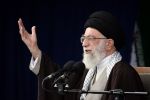 Nation Marks Anniversary of Imam's Passing:
Nation Marks Anniversary of Imam's Passing:
TEHRAN (Dispatches) – Leader of the Islamic Revolution Ayatollah Seyyed Ali Khamenei has said the Islamic Republic of Iran today is more powerful than ever.
“Today, the Iranian nation is by far more powerful compared to the beginning of the revolution in terms of political power and the power to influence global developments,” the Leader said.
Ayatollah Khamenei made the remarks in an address marking the 23rd anniversary of the passing of the founder of the Islamic Revolution Imam Khomeini.
The Leader said one of the examples of the progress of the Iranian nation is overcoming all political, military, security and economic challenges that have aimed to destroy the establishment over the past 33 years.
“What the enemies of Iran fear, and must fear, is not a nuclear Iran but the Islamic Iran,” the Leader pointed out.
The Leader added the achievements of the Islamic Republic over the past three decades have sent quivers down the spine of arrogant powers.
“The Iranian nation has proven that it can achieve progress independent of the U.S. and even in the face of its animosity. This is a big lesson and that is what they fear,” the Leader said.
The Leader further cautioned against U.S. plots to create a rift between Shia and Sunni Muslims and said, “Today, the Americans are using Britain’s experience in causing a religious divide among Shia and Sunni Muslims.”
“Undoubtedly, the future will be better than the past for the Muslim nations, Islam and the Iranian nation,” Ayatollah Khamenei concluded.
The Leader lashed out at the West for lying about Iran's nuclear program in order to cover up their own problems.
Ayatollah Khamenei meanwhile warned the occupying regime of Israel that any attack on Iran would be answered with a "thunderous blow".
"What Americans and westerners do is idiotic. They magnify the nuclear issue to cover up their own problems," Ayatollah Khamenei said, referring to the economic gloom in the U.S. and Europe.
"They are deceitfully using the term nuclear weapons."
The Zionist regime's talk of military strikes showed it felt vulnerable after the fall of former Egyptian President Hosni Mubarak, a U.S. and western ally, last year, Ayatollah Khamenei said. "If they take any miscalculated action, they will receive a thunderous blow."
The war rhetoric, the Leader said, indicates the Zionist regime’s “empty hand, fear and devastation.”
During his address, Ayatollah Khamenei said that sanctions are not hampering Iran and were "deepening Iran's hatred towards the West".
"The obstacles enemies are creating in our path won’t have any effect. Sanctions are ineffective. Sanctions can’t stop the Iranian nation from moving forward," the Leader said.
"The only effect these unilateral and multilateral sanctions have on the Iranian nation is that they deepen hatred and animosity toward the West in the heart of our people."
Ayatollah Khamenei said, “We should relentlessly continue our progress in the fields of politics, science and technology.”
“Iran has proven that without reliance on U.S. or other powers, and even despite being an enemy of the U.S., a nation can achieve genuine progress,” the Leader added.
The Leader's important remarks came as Iranians across the country and outside Iran have held mourning ceremonies to mark the departure of Imam Khomeini.
Every year, millions of Iranians from across the country travel to Tehran to pay tribute to the late founder of the Islamic Republic.
Rouhollah Mousavi Khomeini, who came to be known as Imam Khomeini, was born in the small town of Khomein on September 24, 1902.
Coming from a family of scholars who for generations had devoted their lives to offering religious guidance to the hungry-for-knowledge population, young Rouhollah began his education by memorizing the holy Qur'an and was later sent to Arak (1920-21) and finally to Qom (1923) to complete his religious studies.
During the 1930's, Imam Khomeini did not engage in political activities. Instead, he dedicated his time to teaching Islamic jurisprudence in Qom.
In 1961, Ayatollah Khomeini became a Shia Source of Emulation and gradually entered the political arena. He began anti-Pahlavi activities in January, 1963, when Pahlavi monarch Mohammad-Reza Shah announced his White Revolution program of reform.
Imam Khomeini changed the lives of Iranians and inspired countless others in the world by guiding one of the greatest revolutionary movements of modern history to victory.
Ayatollah Khomeini passed away on June 3, 1989, eleven days after he was taken to hospital for an operation to stop internal bleeding in May 1989.
Addressing mourners at the mausoleum, President Mahmoud Ahmadinejad invoked Imam Khomeini’s insistence on the need to uproot Zionist thinking, noting that the late founder of the Islamic Republic persistently sought the establishment of justice among communities.
“Imam affirmed that we revolted and stood firm to claim the rights of nations and establish justice, and it was for this very cause that he took a stand against the Zionist regime that was obvious injustice and an insult to nations and humanity,” Ahmadinejad said.
“Imam was against the foundation of the Zionist regime and on this basis he established the (international) Day of Quds and stood by the principle of defending the oppressed people of Palestine,” said the president, adding, “Imam was the only person declaring that Zionist thought and domination (over Palestine) must be uprooted from the human community.”
The president emphasized that Imam Khomeini remains alive today, “since monotheism, justice, love and affection are alive.”
Noting that Imam Khomeini never feared any of the global powers due to his submissiveness to God, President Ahmadinejad also reiterated that the late founder of the Islamic Republic remained upfront and frank when it came to the implementation of divine decrees.
The president also reminded the massive audience that the revered Imam invited people to defend justice and take a stand against oppression while he also stood against all forms of discrimination and oppression. “Imam clearly sketched the line of justice,” he added.

















